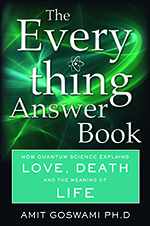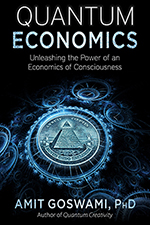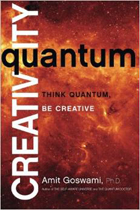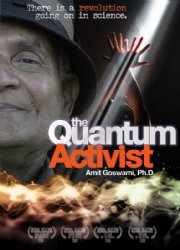Quantum Politics, Part III: Saving Democracy
By Amit Goswami, Ph.D.
In the quantum worldview of evolution, a human being currently is defined by a mental ego. Mind is the major player, and its job is giving meaning to all of our experiences. Evolution of consciousness consists of the evolution of the embodiment of the meaning-giving capacity of the mind. Of course, Darwinism which is all about evolution of matter, has not much to say about the evolution of the embodiments of a nonphysical mind. So a new theory of evolution has been built (Goswami, Creative Evolution).
Besides evolution, the creative capacity of the human mind also progresses via the phenomenon of reincarnation. A human being is born again and again to expand its creative capacity; that is the idea of reincarnation (Goswami, Physics of the Soul).
In essence, the purpose of both processes of personal growth of the human being—collective evolution and individual reincarnation—seems to be making better and better representations of the supramental archetypes. The archetypes most relevant to politics are power and justice. The archetype of goodness (the subject of ethics) is also relevant if politics has to be engaged for the good of the people.
In the human collective unconscious of Jungian vintage (Jung, Collected Works), the archetype of power is represented by the King. This gave us a model of the use of power in a simple hierarchical fashion, top down from the King onto his courtesans eventually all the way down to the serfs who are the bottom of the totem pole. The King’s power is handed down in a hereditary fashion, in this way creating a dynasty.
This is of course lasting elitism, and it created the dubious wisdom that for smooth running of a state, elitism is necessary. But the very fact that the evolution of consciousness has given us democracy shows that this may not be so.
An analysis of reincarnation shows that initially all humans are dominated by conditioning (tamas in Sanskrit), and it takes a few incarnations to catch on to the nuance for creative exploration. Obviously, without direct experience of something new, a human person gets his or her ideas from others in which case he/she better have a defined place in the society suitable for a follower. As one learns to be creative, the archetypes are explored in two stages. The first stage is called situational creativity (Rajas in Sanskrit)—creativity staying within already known representations of archetypes. This is the level of creativity engaged by merchants and politicians. You can tell by the empire-building tendency of these groups. The business people have a lot of tamas and some rajas. People of politics have more pure rajas. The higher stage of creativity is called fundamental creativity (sattva in Sanskrit) when meaning is explored in an expanded arena including new representations of the archetypes themselves. Only with sattva, do people go into inner creativity—transformation of their being to embody love and goodness.
People of rajas will dispense justice selectively because this helps them to expand their own power. Only when a human being has arrived at the quality of relatively pure sattva, the archetype of power has already been explored and there is not much selfish interest in it. Thus it was that Plato suggested in his book on politics Utopia, that only the people of predominant sattva with a modicum of rajas should serve as heads of state, as benevolent dictators, the benevolence coming from their attention to the archetypes of justice and goodness. Then only there would be dispensation of justice with even-handedness.
What does the arrival of democracy mean in this scenario? It means that human beings at all levels are ready or will soon be ready to explore creativity. And political power instead of being concentrated in a few has to be shared with all people. And in order for that to happen, political leaders have to use power to empower people first, for example, lift them from being merely followers. But you can use power in this way only if you have lost interest in hoarding it, that is, only if you have a preponderance of sattva. America was fortunate; its founding fathers, men like Thomas Jefferson were men of predominant sattva. But by and large the progress of democracy has been slow because the political scene has been dominated by people of rajas, then and now. People of predominant sattva (Abe Lincoln, the Roosevelts, John Kennedy) have been relatively rare.
And more recently, the advent of scientific materialism has made creativity itself unpopular in politics and with it ethics. So now power has passed from people of predominant rajas to people of predominant tamas with only a modicum of rajas; hence the dominance of businesspeople in politics.
People of tamas and rajas use power to dominate others. Before scientific materialism, ethics put these people in some restraint. But now all is fair game. So we need to rescue democracy from these power hungry selfish people.
But there is the old catch 22: we need to change our worldview in order to reestablish creativity, archetypes, and ethics in our society which then will produce a new breed of voters, and they, in turn, will produce a new breed of politicians. But we need the new political leadership to change the worldview in a hurry. Or visa versa.
Fortunately, there are always a few avant-garde people who are outside the catch 22. The movement of consciousness, whenever a sea change is required in the society, always creates these people; this, too, seems to be a law of consciousness.
New Political Leadership
Democracy is a political system “of the people, by the people, and for the people.” How can there be a political system of the people unless more and more ordinary people are empowered to process meaning with creativity and explore the archetype of power and justice so that some of them even enter politics? How can there be a government by the people if people are not free to choose without the influence of money and media? How can politics be for the people unless political power is used to serve the people, to empower them? And when is that likely to be offered by our current crop of politicians? Elizabeth Warren could deliver that platform, and because of this she will be blocked at every turn. That is why she is unwilling to run for President.
So simple hierarchy with a King or a King-like figure at the top will have to give away to a ladder in which all the rungs get so mixed up with mobility both up and down that you cannot tell where each rung is any more. In quantum physics we call such a hierarchy a tangled hierarchy.
The fact is, the Jungian representation—King— of the Platonic archetype of power, was created by an earlier people. It has served us for a time through ups and downs, and now the time has come for it to retire. In its place must be a new representation. The image of the new archetypal representation of power is uroboros, depicted as a snake swallowing its tail. Another evocative image is the Indian god Ganesha—the elephant-headed god who removes barriers from people’s path to creativity. Ganesha’s elephant head with a long trunk enables it to serve the ground level of the hierarchy.
Quantum leadership requires the mastery of all three quantum principles—tangled hierarchy, nonlocality, and creativity. Creativity and tangled hierarchy I have already touched upon. Nonlocality is another name for oneness. Why do we require our leaders to promote nonlocal oneness?
The power of manifestation, says the quantum worldview, lies in the nonlocal oneness. If a people learn to act from this level of being, it gets to manifest its intentions so long as it serves the purposive movement of consciousness. Reaching this oneness depends first on our ability to “correlate,” becoming locally entangled with one another. With a common culture to share and with a visionary leader, with the power of the Internet behind us, this is doable. A wise visionary leader can use this local unity to access nonlocal unity, as Gandhi did, as Martin Luther King and Nelson Mandela did.
The new leaders that will usher in a new age of democracy will work with subtle energies; they themselves will be pioneers in the exploration and integration of gross and the subtle experiences in their own psyche. Then they will inspire their people to explore the subtle through synchronous movements in the arenas of economics and education.
Politics, Economics and Education
In my latest book, Quantum Economics, I have proposed a solution of current economic problems with an emphasis on developing a subtle economy. If subtle energies of feelings, meanings, and intuitive archetypal values are made commodities to trade on the marketplace, not only do we develop a balanced forever expanding, yet sustainable, economy but also a transformed people, transformed by their consumption of the subtle.
But such an economics needs the help of visionary political leaders and also a change in the way we educate our young. In truth, a coordinated movement in all three sectors—politics, economics, and education—will be necessary.
The idea works like this: A little political push creates education in the subtle promoting its consumption and, simultaneously, its production. Consumption of the subtle transforms people to want more that is subtle; more education increases sensitivity to increasingly subtler energies that promotes increasing creativity that invades even the political arena. More visionary political leaders, and the cycle will continue.
A Politics of Wisdom is a Politics of Participation
The society of simple hierarchy simply does not use all its available human power. A scientific materialism guided society does not even believe in human power. There is indeed such a movement to undermine human power dominant now. It’s going to lead to catastrophe. Okay, it is well known that consciousness uses such catastrophes to promote quantum leaps in evolution. But there is a subtler, gentler way.
How do we achieve tangled hierarchy between people of such basic difference as the male and the female of our species? We work on integrating the values of both into creating a unisexual human.
In my previous article, I mentioned a myth for a quantum leader to follow: the myth of hero’s journey. There is another myth that is important for our leaders to incorporate—the myth of ardhanarishvara—a Sanskrit word denoting a god who is half-male/half female. This myth is hinting at integrating the male and female within us—the head centeredness and heart centeredness, if you will. When we do this, we will have a participatory democracy that goes way beyond what voting rights have given to women, even what increasing access to leadership positions have given to women.
The same consideration applies to incorporating other human differences, and when we successfully have done this, there will be a level of participation in politics the likes of which has never been seen.



